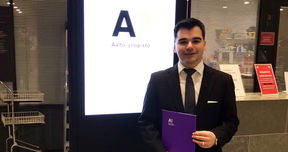Doctoral studies taught Osman Yilmaz the value of trial and error

Senior Researcher and Research Project Manager Osman Yilmaz, what has your study path been like?
I came to Aalto University when I was studying for my Bachelor’s degree. I was studying electronics and communication engineering and at Aalto I focused on radio communications or what they nowadays call wireless communications.
I completed my bachelor’s and master’s degrees and decided to continue my studies, still focusing on wireless communications. In that topic, I specialised in a concept called self-organising networks. It’s about the optimisation of wireless networks, or more specifically mobile networks, that helps keep the networks available at all times. This enables you to have an uninterrupted call while driving, for example. Alternatively, if there’s a problem in one of the base stations in the area, other base stations can compensate for the failure so that there’s no one out of coverage.
What are you working on now?
Now, I’m working on 5G – which is a new generation of mobile connectivity – at Ericsson. With this generation of mobile connectivity, we aim to connect everything: not only humans but also machines and objects. I’m working on improving mobile connectivity technology, so it’s a continuation of my research at Aalto. Before Ericsson Research, I worked at Nokia, also doing research that was relevant to my PhD.
Why do you recommend doctoral studies?
There are several benefits. One of the major things is that you learn to start a project that will last quite a long time. You learn how to manage it: how to plan, execute and handle it yourself. It’s a big responsibility, perhaps one of the biggest you can take in your working life.
Doctoral studies will also teach you the scientific process. You will learn how to start research on a certain topic and how to progress in it.
When you’re managing a project on your own you need to develop lots of skills. You need to master your subject and know what has already been done. You need to get creative and find yourself new targets in that area and learn how to reach them.
In my case, I had to learn programming. As I cannot change something in a real product – in a live network for example – and test it, and I cannot create a new generation of technology that requires thousands of people on my own, I have to simulate it. And to simulate something requires creating models on a computer. So, not only do you master your subject and create your plan and research goals, but you also need to develop new skills.
Finding the best solution to your research hypothesis requires a lot of trial and error. One thing you will learn is that there’s always a better way to do something. And then, eventually, you will complete something. For me it took a while because I was working full-time while doing my PhD, but I got there.
It also teaches you how to communicate with other people. Even though you do most of the work alone, you need to be in touch with other researchers to learn from them. Reading isn’t always enough. To know about the current research being done at other universities and by other people, you need to attend conferences and network with people. Sometimes you need to collaborate to create better solutions or to find reliable conclusions. You will also learn how to present and sell your ideas.
The Ceremonial Conferment of Doctoral Degrees in Technology will be held at Dipoli during the Ceremony Week on 14 June 2019. This year the distinguished academic event will be hosted by the School of Electrical Engineering.
The Ceremonial Conferment of Doctoral and Master's Degrees in Arts, Design and Architecture at Aalto University will take place on 13 June 2019.
Read more news

Aalto University is introducing ORCID’s Researcher Connect service
Aalto University is introducing ORCID's Researcher Connect service, which facilitates information transfer between researchers' ORCID profiles and the university's research information management system, ACRIS.
Nature of Process: Exhibition by the students of the ‘Personal Exploration’ Course
Nature of Process is a multi-material exhibition of 14 Master´s students of Aalto ARTSEden Telila's master's thesis contributed to Ramboll's geotechnical toolkit
Geoengineering alum Eden Telila helped Ramboll automate manual tasks.






